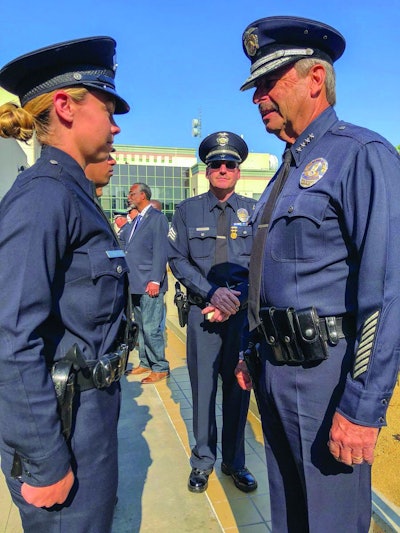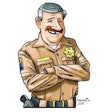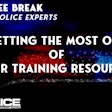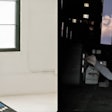 Retiring LAPD Chief Charlie Beck hopes to share wisdom with officers still on the job. Photo: LAPD
Retiring LAPD Chief Charlie Beck hopes to share wisdom with officers still on the job. Photo: LAPD
Police work is a thinking person's game. When done right, it requires a person to be an expert tactician, a relationship counselor, a legal scholar, and a discerning interpreter of the human condition. In my life, I have had the benefit of watching my father move through his career with the Los Angeles Police Department and achieve the rank of deputy chief. The way in which he conducted himself and led those around him impacted me greatly. Even today, I know that I am really getting it right when I hear him in my own words. With that said, I can't say that I have done things as well as him, but I have tried. And, as much as they have allowed me to, I have passed the wisdom of my own experiences on to my children, who are each carrying on the tradition of working in law enforcement.
Having a family tradition of serving the city and county of Los Angeles is a source of great pride for me. Regardless of whether you are third-generation law enforcement or the first person in your family to ever wear a badge, all law enforcement officers carry with them the legacy of those who came before them. It is from that legacy, which emerges out of both the ordinary and the heroic acts, the triumphs and the mistakes, that we each continue to shape the history of law enforcement in America.
Several themes emerge as I look back on my own small piece of that history. They are things that I wish I understood better when I was younger on the job. They are also things that I hope those who come after me can find of some service as they continue the work that I am leaving behind.
Make Your Career a Choice
I did not always plan to be a police officer. Before joining the job, I wanted to be a professional motocross racer, but was denied that opportunity because of insufficient talent. Once it finally became obvious to me that a career in racing was not in my future, I had to make some decisions. My father was aware that I had never considered becoming an officer, but he also knew the value of the career and encouraged me to become a reserve officer for the LAPD. Doing so allowed me to experience how working as an officer made a difference in people's lives, sometimes on their worst day. The ability to give back to the people and the city where I was raised ultimately led to my decision to become a full-time police officer.
While my initial foray into law enforcement had an element of happenstance, each step of my career after that point, including deciding when to conclude it, was done with intention. Acting with intention, rather than having my career change around me as a consequence of societal and organizational pressures, has helped me navigate the chaotic times that have faced my organization and the law enforcement community as a whole.
Law enforcement officers are presently called on to take on more societal concerns than ever before. When presented with a city's growing homeless population, increasing calls for service regarding persons with mental illness, or an unflagging opioid crisis, officers are asked to address the concerns deftly and with precision. These matters are complex and are not something that we can merely arrest our way out of. It makes for a challenging time to be a police officer, but I firmly believe that we, as a law enforcement community, can meet those needs if we choose to.
As I look at agencies across the country, their collection of new and tenured officers have a greater combination of education, life experience, diversity of opinion, and understanding of nuanced ways to approach complex problems than ever before. As law enforcement professionals, we cannot shy away from the tasks we have been presented. We have to choose to show up each day and be fully engaged. We have to choose to move beyond the rhetoric that can surround the profession. We have to choose to stand with our brothers and sisters and use every call for service, every traffic stop, and every community contact as an opportunity to shape our own narrative of how law enforcement is seen. By moving with intention and making every aspect of our career a choice, we are able to more effectively add justice to a chaotic world.
Respect Individual Rights
When I joined the LAPD in 1975, Los Angeles was only a decade removed from the civil unrest that led to the burning of much of the neighborhood of Watts. I could not know or understand then that the way in which we continued to police the streets of Los Angeles would lead to even greater civil unrest in 1992. Following the acquittal of LAPD officers tried for using excessive force during the arrest of Rodney King, citizens who lived in some of the communities with the most police oversight took to the streets. They manifested decades of frustration and anger at being on the receiving end of an "us versus them" mentality that was created by the LAPD. Watching the city I grew up in burn and listening to the disdain the community had for my Department was the low point of my career.
At the time the riots started, I had more than 15 years on the job. Regardless of their own background or division of assignment, I knew from firsthand experience that most officers were well-intentioned. Their sole desire was to protect the public. But in the six days of rioting, it became evident that our intentions and our actions were not having the desired impact on the public. The public did not see us as the enforcers of law and order or as the instruments of justice. They saw us as an oppressive force that indiscriminately moved through minority neighborhoods, arresting some and beating others.
Finding a way to align intention, action, and perception has been the ongoing work of the Los Angeles Police Department ever since the last fire was put out in 1992. In the decades that have followed the riots, the Department has steadily moved away from being an agency that led with its fists to one which leads with its heart. Doing so has required that we no longer have officers serving as tools of the state. Instead, they have been allowed to make their primary obligation the protection of individuals and their rights.
Emphasizing the rights of the individual can seem to be in direct opposition to how the profession of law enforcement is broadly understood. Generally, police officials are seen as agents of the state whose primary responsibility is to enforce its laws and ordinances. What the LAPD and many other like-minded agencies across the country have found, however, is that only focusing on the rights of the state inhibits our ability to effectively serve the communities who have placed their trust in us. By making the protection of the rights of the individual our primary focus—whether it's the right to assemble, the right to free speech, or the right to be free from unlawful searches and seizures—we are able bring the way the public perceives our actions into alignment with the intentions behind them.
Lean On Family and Friends
Throughout your career, you will go through countless hours of training. Each of the courses will be designed to enhance your knowledge of how to safely and effectively perform your job. Many will think that it is a combination of those courses and on-the-job experience that will define who you are as an officer. I would argue, however, that what defines you was established long before you ever drove a black-and-white, put on a uniform, or entered a training academy. I would argue that every aspect of your career is determined by your character, character that was created over time by life experiences before law enforcement with the people who know you best.
Your family and friends who you knew before joining the job are the keepers of your history. They know all of your stories, both good and bad. In knowing those things, they will be the ones who will know best how to help you navigate the adverse conditions that this profession can bring.
Even at this point in my career, I try to meet with my father each week. Law enforcement has changed so dramatically since his last days at work that it is almost unrecognizable. Thus, I am not spending time with him to gain specific advice on the logistics of running an agency. I spend time with him because he knows who I truly am, which brings me back to my center.
No officer who serves a full career will make it to retirement without experiencing periods of acute stress. Those of us who are lucky will only have a single stressor at any given time. For the rest of us, multiple stressors will often find their way into our lives at the same time. During those periods, it can be easy to lose oneself to subtle repercussions, like becoming jaded, that grow into larger issues that manifest themselves in problems away from work. Ultimately, I am of the opinion that the people who you knew before you joined law enforcement are uniquely suited to guide you through these difficult periods in life. Though they may not understand the details of the job, they understand you and your true character. They have the ability to push that character to the forefront when the rigors of your chosen career threaten to take you off course.
It's Upside Down
I say all of these things not from a position of righteous authority, but rather from the position of a man who has come to the humble realization that there is an inherent problem in policing—it is built upside down.
By the time you become wise enough to do this job, you are too old to do it. With that in mind, it is my hope that at least some of this resonates with those of you who are continuing on the journey I embarked upon more than 40 years ago.
When I think about the Los Angeles Police Department and the changes we have undergone during my tenure, I am confident in who we are today and am secure in the belief that we will be even better tomorrow. The same is true when I think of the law enforcement family that exists across this country. It has been an honor and a privilege to be part of the law enforcement family. The badge and the people who wear it will forever be in my heart. To each of you, it is my sincere hope that you will always lead with your heart and be defined by your character. Stay safe.
Charlie Beck is retiring this month after a career with the Los Angeles Police Department spanning 43 years. He served as chief of the LAPD from November 2009 to June 2018.










